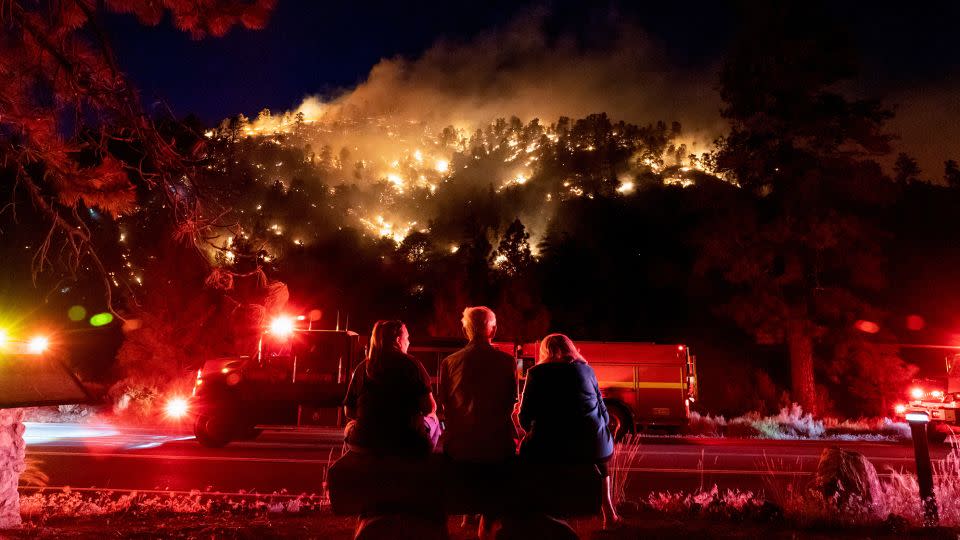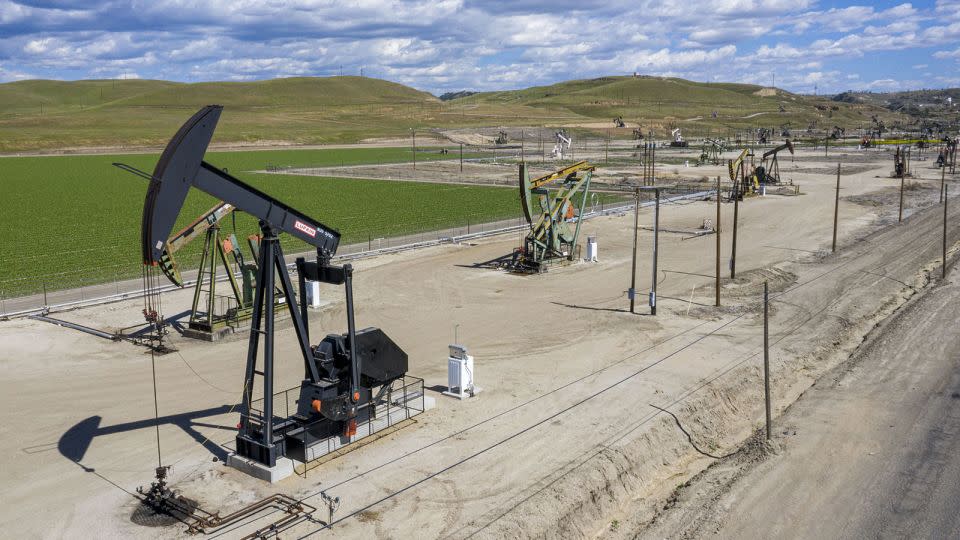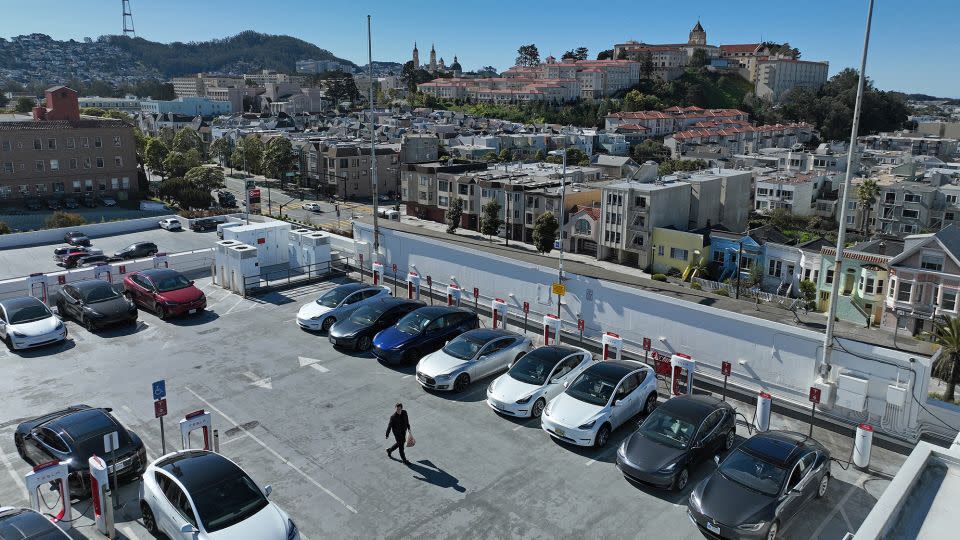California seals its reputation as a climate juggernaut with a wave of legislation and head-turning lawsuit
- Oops!Something went wrong.Please try again later.
California Gov. Gavin Newsom drew loud cheers and applause on Wednesday when he spoke at the UN’s Climate Ambition Summit in New York, after pointedly calling the climate crisis “a fossil fuel crisis.”
He told the room full of global leaders, climate advocates and non-governmental organizations the world needs to phase out oil, gas and coal and castigated the fossil fuel industry for “deceit and denial.” He was also the lone US official who spoke at the UN secretary general’s hand-picked summit, though climate envoy John Kerry also attended.
It was an overwhelming response from an audience of people who, while optimistic about humanity’s ability to solve the climate crisis, are cynically used to hearing leaders give the issue watered-down lip service.
“Everyone was clapping and saying, ‘This is what we were expecting from the US leadership the whole time,’” Frances Colón, senior director of international climate policy for the Center for American Progress, told CNN.
Newsom’s moment in the spotlight capped several weeks of significant action in California that bolstered its reputation as a climate juggernaut.
It launched a major lawsuit against five big oil companies for what it calls a long-standing pattern of deceiving the public on the effect of their products. Its legislature passed a raft of climate and clean energy measures, including first-of-its-kind bills mandating large companies disclose their planet-warming pollution and climate risk.
This is all in addition to California’s move to ban sales of new gas-powered cars by 2035, which has the power to impact the entire US auto market, given 17 other states followed its lead.
California has always pushed the envelope on climate policy, but its legislative supermajorities, significant legal resources and policy acumen are giving it increasingly national impact.
“California was a lab experiment, now it’s a leader,” former California Air Resources Board member Daniel Sperling told CNN. “Others are following, as opposed to it being a one-off.”
‘Profit to the tune of billions’
California has faced a firehose of extreme climate impacts in the past several years. Wildfires have wrought deadly devastation, reservoirs have plummeted amid historic drought and – in a remarkable bout of weather whiplash – more than a dozen atmospheric rivers flooded towns and caused hundreds of landslides.
California’s lawsuit against BP, ExxonMobil, Chevron, Shell and ConocoPhillips and their trade group, the American Petroleum Institute, accuses them of decades of public deception that resulted in billions of dollars in harm from climate change-fueled disasters.
California Attorney General Rob Bonta told CNN the case is a “game changer” and a “watershed moment” for climate litigation.
“This is based on a very simple but powerful premise of fairness and the fact that you are responsible for your actions, so you must be held accountable,” Bonta said. “The people of California don’t deserve to be lied to and have the costs of climate change shifted to them while these big oil companies profit to the tune of billions and billions of dollars every year.”
The lawsuit claims the oil companies created a public nuisance, damaged natural resources and state property and violated California law. It seeks injunctive relief and proposes fossil fuel companies pay what Bonta said could be “tens of billions of dollars, if not approaching or even exceeding hundreds of billions” into a new abatement fund that would help the state deal with future climate damages.

“When it comes to wildfires, that can be forest management or increased wildfire response,” Bonta said. “When it comes to drought, there can be water storage and water distribution. When it comes to sea rise, there can be sea walls built. For extreme heat, cooling centers. We’re asking fossil fuel companies for the abatement plan to pay for it instead of doing what they’re doing now, which is forcing Californians to bear those costs.”
In response to the lawsuit, Ryan Meyers, the Senior Vice President and General Counsel of the American Petroleum Institute trade group, previously told CNN he believes the industry has achieved its goal of providing affordable and reliable energy while “substantially reducing emissions and our environmental footprint.”

California isn’t the first state to challenge Big Oil in court. But the California suit is significant for the size of the state’s economy and its vast legal resources.
“We had never seen a gorilla come in to put forward a case against fossil fuel companies,” Christiana Figueres, former executive secretary of the United Nations Framework Convention on Climate Change, said during Thursday remarks. “That is a major, major upgrade in the liabilities and the reach that climate litigation can have.”
Bonta said the case could take months or even years to get through a trial but emphasized previous courts have ruled California can pursue the case against Big Oil on its merits – clearing a major jurisdictional hurdle.
“These cases have not gotten to the merits yet, but now they can, and they will,” Bonta told CNN. “We have the full power and force of California and our California Department of Justice behind this case.”
Making companies disclose pollution
Among the dozens of bills that passed the Democratic-controlled legislature this session, one grawing the most headlines will require thousands of major companies operating in California and make more than $1 billion a year disclose their climate pollution – even the pollution coming from the use of their products.
California’s major companies and banks, including Apple, Salesforce and Wells Fargo, would have to disclose their pollution if the bill is signed, which Newsom has promised to do.
Another bill that could work in tandem with the pollution disclosures would require companies making more than $500 million to publicly disclose the ways climate change impacts their financial risk.
The repercussions of both bills are still unknown, experts said – and there is a chance the disclosures won’t be accurate given corporations would be responsible for self-reporting.
“The answer is no one really knows what the effect will be of those disclosure requirements,” Robert Stavins, director of the Harvard Environmental Economics Program, told CNN. “There would have to be some kind of monitoring and enforcement mechanism, otherwise a company could say whatever they wanted.”
Still, Stavins said the greenhouse gas disclosure bill is significant, and “novel, in terms of legislation.”

Other measures passed by the California legislature this year include a bill that would speed the development of floating offshore wind farms, as well as a bill making offshore oil and gas development more difficult to get approved. The legislature also approved a bill to make the state’s school buses zero-emission vehicles by 2035. Newsom has not yet said whether he will sign the bills.
California is the world’s fifth largest economy, and what it does matters nationally. More than a dozen other states are following its lead on measures including enacting strict vehicle emissions standards and banning sales of new gas cars by 2035, experts told CNN.
Sperling, the former CARB board member who was one of the people responsible for designing the state’s vehicle emissions standards, said he was thinking about the bigger picture.
“I saw it as my role to be constantly reminding everyone that what California does with greenhouse gases in California is almost irrelevant in terms of the actual emissions,” he said. “Its importance comes from being a leader; having others follow us.”
Sperling said California and the states that follow its emissions regulations make up about a third of the US market, potentially making federal emissions regulations “not that hard to meet given California and the other states are already pulling so many EVs in the market.”
Even so, Stavins said California’s actions are not a silver-bullet climate solution for the US. Conservative states will likely remain untouched by the impacts of California’s legislation and lawsuits.
“California is not the US, the California legislature is not the US Congress, and the California governor is not the president,” Stavins said. “Be careful about thinking that because something works in California, it will work politically in other parts of the country, or nationally.”
CNN’s Caroll Alvarado and Rachel Ramirez contributed to this report.
For more CNN news and newsletters create an account at CNN.com

